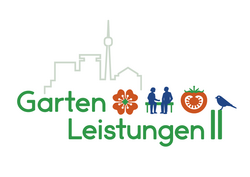GartenLeistungen II Urban Gardens and Parcs: Implementation, stabilization and transfer of approaches for socially, ecologically and economically sustainable management of urban areas and flows of materials
Urban gardens and public parks constantly compete with other uses for space. However, they play a central role in sustainable urban development: They increase the resource efficiency of urban neighborhoods and provide a wide range of social, ecological and economic services for urban society.
The GartenLeistungen I project assessed the multidimensional services of selected urban gardens and parks in order to provide information on frequently neglected services for political decisions. For this purpose, material flows (e.g., water, biomass, food, energy), ecological (e.g. urban climate, biodiversity) and social impacts (e.g. quality of life, social exchange, transformative learning) were quantified and evaluated.
In the implementation phase, the GartenLeistungen II project aims to perpetuate the processes initiated in Berlin and Stuttgart in municipal planning and policy and to transfer the project results to other cities.
Therefore, the results from the real laboratories will be transferred to Frankfurt a. M., Leipzig and Berlin, where they will be incorporated into municipal processes with partners from the city administration. The project is consolidating the solutions for resource efficiency, closing water cycles, the local production as well as use of food and biomass in urban gardens and parks, together with the participating practitioners from administration, park management, and garden initiatives.
The evaluation of the services will also be transferred to other municipalities and urban gardens and parks in different contexts conditions. Dissemination of the results and networking beyond the participating municipalities is planned with the support of the nationwide networks of the ‘anstiftung’ and the GALK (German Conference of Garden Authorities. GartenLeistungen II also strengthens the knowledge transfer of the project results and the nationwide networking of relevant actors from science, administration, politics and civil society by holding a result conference.
More information (in German): www.gartenleistungen.de
Publications and materials from the first project phase can be found here.




